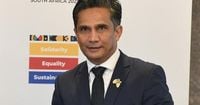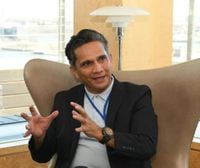South Africa is stepping into the global spotlight, with Zane Dangor, the nation’s Director-General of International Relations and Cooperation, leading the charge during a diplomatic mission to the United States. This visit, which occurred in early April 2025, aimed to clarify misconceptions surrounding the controversial Expropriation Act and address human rights policies in post-apartheid South Africa. The discussions were particularly timely as South Africa prepares for its upcoming G20 Presidency, set to commence in 2025.
During meetings with senior officials from the White House, State Department, and Treasury, Dangor's delegation sought to correct misinformation regarding the Expropriation Act, signed into law in 2024. This legislation allows the government to take land without compensation in specific circumstances, a move designed to rectify the historical injustices of land ownership disparities that persist in the country.
The Expropriation Act has sparked significant debate both domestically and internationally. Proponents argue it is a necessary tool to address the stark inequalities left by apartheid, where Black South Africans, over 80% of the population, own only about 4% of private farmland, while white South Africans, who constitute less than 10% of the population, control nearly 75% of the agricultural land. Critics, however, claim that the Act threatens property rights, especially for minority groups.
In Washington, Dangor emphasized that the Expropriation Act is not aimed at unlawful land seizures but is rather focused on fairness and progress. He stated, "We’re not taking land to settle scores. This is about fixing a system that’s been broken for centuries." The delegation clarified that the Act targets situations involving unused land held for profit, idle state-owned land, abandoned properties, and low-value land where the market value is equivalent to or less than the state’s investment.
The discussions in Washington were cordial yet direct, with U.S. officials raising concerns fueled by claims from groups such as AfriForum, which have characterized the Act as a "race law" aimed at punishing minorities, particularly Afrikaners. Dangor’s team brought facts to the table, illustrating the ongoing racial inequalities that still shape South Africa’s socio-economic landscape.
As part of the broader diplomatic effort, Dangor's delegation also attended the United Nations General Assembly in New York, where they secured strong support for South Africa's G20 priorities. The theme of South Africa's G20 Presidency revolves around solidarity, equality, and sustainability, which received overwhelming endorsement from UN member states. With the African Union now a full G20 member, South Africa is positioned to advocate for the continent's needs on critical issues like debt relief, climate change, and fair trade.
However, the diplomatic landscape has become increasingly complicated following President Donald Trump’s Executive Order issued on February 7, 2025, which froze U.S. aid to South Africa and suggested the resettlement of Afrikaner farmers as refugees due to alleged “race-based discrimination” linked to the Expropriation Act. The South African government responded firmly, labeling the order as based on misinformation. The Department of International Relations and Cooperation (Dirco) pointed out that the U.S. itself has laws permitting land seizures for public use, a practice known as eminent domain, suggesting that South Africa's approach is not out of the ordinary.
Dirco spokesperson Chrispin Phiri remarked, "We hope the U.S. will take a closer look at the facts. Our Act isn’t about targeting anyone—it’s about building a fairer country." The delegation used their meetings to urge Trump’s administration to reconsider the executive order, framing South Africa as a strategic partner rather than a nation to be sidelined.
In addition to addressing the Expropriation Act, the discussions also touched on broader human rights issues. Some U.S. officials have expressed concerns that South Africa's policies may infringe on the rights of minorities. Dangor's team countered these claims by highlighting how initiatives like the Expropriation Act and Black Economic Empowerment (BEE) aim to uplift those left behind by apartheid rather than oppress others. They stressed that the South African Constitution mandates the government to rectify historical injustices, which includes addressing the deeply rooted racial and structural inequalities that still persist.
Despite the challenges, Dangor's delegation is committed to fostering a more nuanced understanding of South Africa's policies among U.S. officials. This visit marked the first high-level interaction between South African and U.S. officials since the removal of Ambassador Ebrahim Rasool by the U.S. State Department in March 2025, following remarks that were perceived as critical of Trump's administration.
As South Africa navigates its complex past and future, the diplomatic efforts led by Zane Dangor represent a crucial step in reinforcing the nation’s position on the global stage. With the upcoming G20 Presidency, South Africa is poised to advocate for equity and justice, drawing attention to the needs of the African continent while simultaneously addressing the misconceptions that threaten its international relationships.
In conclusion, South Africa's efforts to clarify its stance on the Expropriation Act and human rights policies during high-level talks in Washington reflect a broader commitment to rectifying historical injustices while fostering international partnerships. As the nation prepares for its G20 leadership role, the importance of clear communication and diplomacy cannot be overstated.








